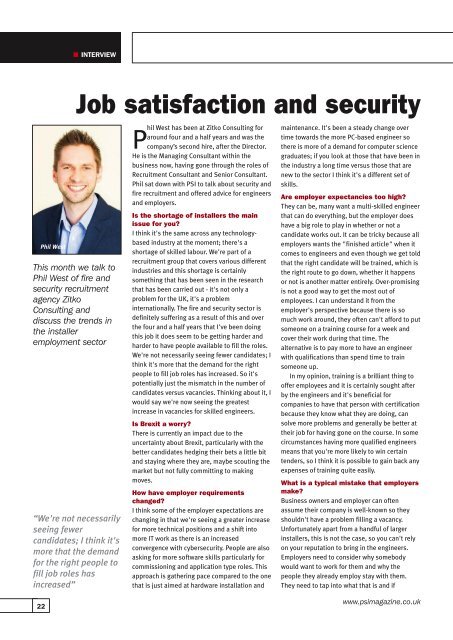PSIMay2019
You also want an ePaper? Increase the reach of your titles
YUMPU automatically turns print PDFs into web optimized ePapers that Google loves.
INTERVIEW<br />
Phil West<br />
This month we talk to<br />
Phil West of fire and<br />
security recruitment<br />
agency Zitko<br />
Consulting and<br />
discuss the trends in<br />
the installer<br />
employment sector<br />
Job satisfaction and security<br />
“We're not necessarily<br />
seeing fewer<br />
candidates; I think it's<br />
more that the demand<br />
for the right people to<br />
fill job roles has<br />
increased”<br />
hil West has been at Zitko Consulting for<br />
Paround four and a half years and was the<br />
company’s second hire, after the Director.<br />
He is the Managing Consultant within the<br />
business now, having gone through the roles of<br />
Recruitment Consultant and Senior Consultant.<br />
Phil sat down with PSI to talk about security and<br />
fire recruitment and offered advice for engineers<br />
and employers.<br />
Is the shortage of installers the main<br />
issue for you?<br />
I think it's the same across any technologybased<br />
industry at the moment; there's a<br />
shortage of skilled labour. We're part of a<br />
recruitment group that covers various different<br />
industries and this shortage is certainly<br />
something that has been seen in the research<br />
that has been carried out - it's not only a<br />
problem for the UK, it's a problem<br />
internationally. The fire and security sector is<br />
definitely suffering as a result of this and over<br />
the four and a half years that I've been doing<br />
this job it does seem to be getting harder and<br />
harder to have people available to fill the roles.<br />
We're not necessarily seeing fewer candidates; I<br />
think it's more that the demand for the right<br />
people to fill job roles has increased. So it's<br />
potentially just the mismatch in the number of<br />
candidates versus vacancies. Thinking about it, I<br />
would say we're now seeing the greatest<br />
increase in vacancies for skilled engineers.<br />
Is Brexit a worry?<br />
There is currently an impact due to the<br />
uncertainty about Brexit, particularly with the<br />
better candidates hedging their bets a little bit<br />
and staying where they are, maybe scouting the<br />
market but not fully committing to making<br />
moves.<br />
How have employer requirements<br />
changed?<br />
I think some of the employer expectations are<br />
changing in that we're seeing a greater increase<br />
for more technical positions and a shift into<br />
more IT work as there is an increased<br />
convergence with cybersecurity. People are also<br />
asking for more software skills particularly for<br />
commissioning and application type roles. This<br />
approach is gathering pace compared to the one<br />
that is just aimed at hardware installation and<br />
maintenance. It's been a steady change over<br />
time towards the more PC-based engineer so<br />
there is more of a demand for computer science<br />
graduates; if you look at those that have been in<br />
the industry a long time versus those that are<br />
new to the sector I think it's a different set of<br />
skills.<br />
Are employer expectancies too high?<br />
They can be, many want a multi-skilled engineer<br />
that can do everything, but the employer does<br />
have a big role to play in whether or not a<br />
candidate works out. It can be tricky because all<br />
employers wants the "finished article" when it<br />
comes to engineers and even though we get told<br />
that the right candidate will be trained, which is<br />
the right route to go down, whether it happens<br />
or not is another matter entirely. Over-promising<br />
is not a good way to get the most out of<br />
employees. I can understand it from the<br />
employer's perspective because there is so<br />
much work around, they often can't afford to put<br />
someone on a training course for a week and<br />
cover their work during that time. The<br />
alternative is to pay more to have an engineer<br />
with qualifications than spend time to train<br />
someone up.<br />
In my opinion, training is a brilliant thing to<br />
offer employees and it is certainly sought after<br />
by the engineers and it's beneficial for<br />
companies to have that person with certification<br />
because they know what they are doing, can<br />
solve more problems and generally be better at<br />
their job for having gone on the course. In some<br />
circumstances having more qualified engineers<br />
means that you're more likely to win certain<br />
tenders, so I think it is possible to gain back any<br />
expenses of training quite easily.<br />
What is a typical mistake that employers<br />
make?<br />
Business owners and employer can often<br />
assume their company is well-known so they<br />
shouldn't have a problem filling a vacancy.<br />
Unfortunately apart from a handful of larger<br />
installers, this is not the case, so you can't rely<br />
on your reputation to bring in the engineers.<br />
Employers need to consider why somebody<br />
would want to work for them and why the<br />
people they already employ stay with them.<br />
They need to tap into what that is and if<br />
22<br />
www.psimagazine.co.uk

















